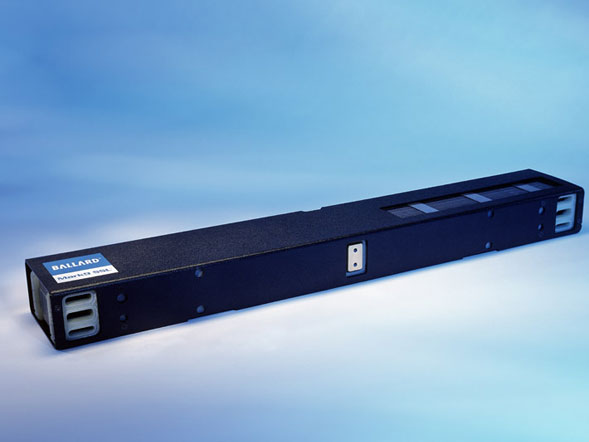 Ballard Power Systems' Mark 9 SSL. |
by US correspondent Roger RenstromFuel-cell-stack developer Ballard Power Systems Inc is focusing on forklifts while it waits "seven or eight years" for the automotive world to broadly implement its technology.
The forklift, residential cogeneration and backup power segments may become "very large markets," John Sheridan, Vancouver-based Ballard CEO, said during a July 26 conference call with security analysts. "We are focused very sharply on positive margin revenue growth as we go forward. We see significant potential" in the non-automotive market.
During the second quarter ended June 30, Ballard shipped 36 of its liquid-cooled hydrogen-fueled Mark 9 SSL to the forklift market and booked new orders for two units. The Mark 9 SSL is a direct derivative of an automotive fuel cell product. Ballard shipped 102 of its hydrogen-rich reformate-fuel-based Mark 1030 for forklift, residential cogeneration and back-up power applications, and it booked 94 new orders for the product.
Ballard lead customers General Hydrogen Corp and Cellex Power Products Inc "are currently active in field trials and demonstration programs with five major forklift end users including Bridgestone and Wal-Mart," Sheridan said. "The operational feedback continues to be positive on a number of key parameters" such as product life, time between failures and refueling efficiencies.
Ballard develops, manufactures and markets zero-emission proton exchange membrane fuel cell stacks, and lead customers such as General Hydrogen and Cellex Power handle systems integration, fueling and sales with end users.
Upon conclusion of the forklift trials, "we anticipate additional shipments and follow-on orders," Sheridan said.
Across the global industrial truck market, Ballard estimated there could be sales of about 400 fuel-cell units for forklifts this year, 1,000-2,000 units per year in 2007 and 2008 and 6,000-12,000 units per year in 2009 and 2010.